Parliament Elects 7 Members of Public Broadcaster's Programming Council
ZAGREB, 5 March, 2021 - Parliament on Friday elected by secret ballot seven members of the Croatian Radio-Television (HRT) Programming Council.
They are Nikola Baketa (99 votes), Vlaho Bogišić (101), Đemal Bratić (89), Ivica Lučić (89), Zorislav Lukić (83), Robert Markt (85) and Ozana Ramljak (92).
They were on a list of ten candidates recommended by the parliamentary information and media committee.
Which two will have a shortened term will be decided by the Programming Council, the committee decided. The committee's public call for applications stated that five Progamming Council members would be appointed to a term of four years and two until 12 July 2023.
HUP Appeals to HRT to Expand Decision on Suspension of Subscription Fee
ZAGREB, April 9, 2020 - The Croatian Employers' Association (HUP) on Thursday welcomed the decision by the public broadcaster HRT to temporarily suspend subscription fees for all businesses ordered by the national civil protection authority to cease operating, calling for the decision to apply to all other entities affected by the present crisis.
"We welcome the decision by the HRT director-general on the temporary suspension of the monthly subscription fee for all entities that ceased operating by order of the national civil protection authority. However, we have to point out that this decision does not apply to activities and businesses whose operation has not been officially suspended, but which have no work or revenue," the HUP said in a statement.
The decision, made on April 7, will be in force from April 1 until the cessation of the coronavirus emergency, as decided by the national civil protection authority.
More coronavirus news can be found in the Lifestyle section.
Croatia Presidential Debate: Hopefuls on Corruption, Taxes, Foreign Policy
On Thursday evening January 2, 2020; HRT (Croatia Radio Television) moderated the second of three debates between presidential candidates Croatian President Kolinda Grabar-Kitarović and former Prime Minister Zoran Milanović.
During the two-hour debate, the candidates answered 40 questions – which were divided into several groups including the economy and demographics, foreign policy and presidential powers, national security and the fight against corruption. Of course, there was a set of questions pertaining to worldviews and personal questions, as reported by Index on January 2, 2020. Here are a few highlights from last night’s debate:
Candidates’ Opening Statements:
Milanović: I am aware that I need to reach out to people who don’t intend to vote for me in the second round. I will defend the constitution and fight for the rights of all citizens. I will fight corruption, the monster which has consumed Croatia. The present government and president do not understand the difference between the public and private. Nor do they understand what it means to fight corruption. Those who break the law will not get any preferential treatment from me.
Kolinda: As a woman, I broke through the glass ceilings in the world. I was the first woman foreign minister, have important world connections and was one of the first presidents to meet Trump. I will move away from ideological issues.
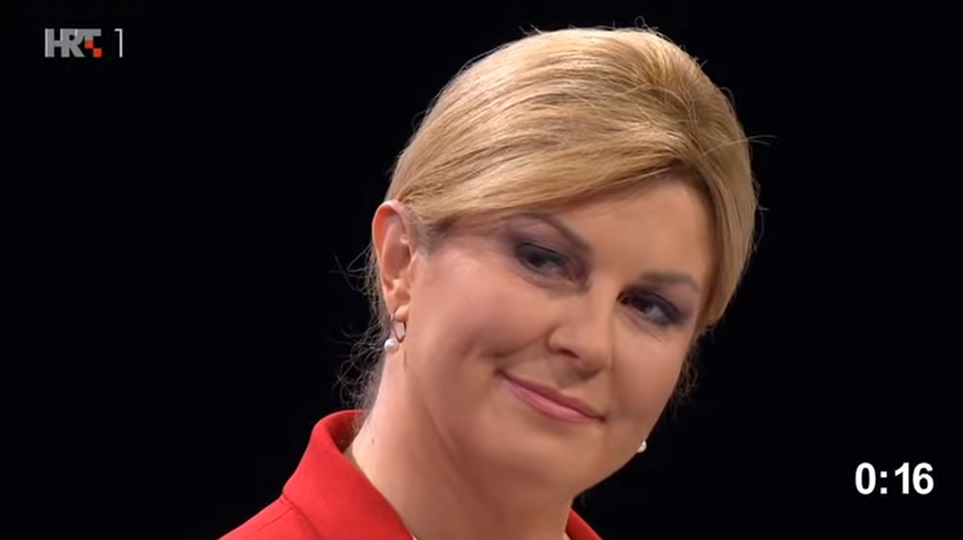
Entrepreneurs are complaining about high taxes. Are they too high?
Kolinda: The tax burden is too great. I do not want to please everyone, otherwise I would say what everyone wants to hear, and I am already too controversial. Zoran Milanović's government raised the VAT from 23 to 25 percent, which was a big blow. I am in favor of reducing taxes because that is the only way to secure higher salaries, create new jobs, investments and encourage people to stay. I will advocate for higher take-home wages and higher wages for employees.
Milanović: You are saying this to please everyone. Life is not like that, and it’s easy for someone who has never earned anything on their own. It is expensive to finance state obligations; including education and care for the elderly. Increasing the VAT rate during the recession was not a blow. Prices did not rise, so that thesis that does not hold water.
Kolinda: I’ve been working for a living since my third year of college. You addressed the deficit by increasing the VAT. I won’t allow you to downplay this failure because it was the VAT that impoverished our citizens. You had a budget deficit with a higher VAT. You can’t rely only on taxes to finance the state budget.
Milanović: How else would the budget be financed? From exports? This shows complete ignorance of fiscal policy.
How do we bring young people back to Croatia?
Milanović: The exodus began in 2016. Poland, Romania, Lithuania had the same problems after joining the EU. Did it destroy those states? As far as I know it did not. We are having moral panics in the Republic of Croatia. We are here, we will fight, we will survive, and they will return. I cannot blame either Milanović or Kolinda for the exodus.
Kolinda: The exodus began during the Milanović government due to pre-bankruptcy settlements and enforcement law. I'm not having a moral panic.
Milanović: Thousands of jobs were saved by pre-bankruptcy settlements, it's ridiculous to say that this is the reason for the exodus. Please don't embarrass yourself.
Kolinda: The fact is that pre-bankruptcy settlements benefitted your friends.
Who is Croatia's biggest ally?
Kolinda: It's the US and we are currently working on concrete proposals.
Milanović: Ms. Kitarović accomplished nothing when she was Croatian ambassador to the United States. You must be totally lost if you are claiming that the United States is our greatest ally. If the US is our closest ally; we are certainly not theirs. The current administration is what it is, and I don't want to fault them, but the EU is our biggest ally and the largest agent of peace in the world.
Kolinda: Of course, we are working with all EU countries. Let’s allow Milanović to highlight some of his achievements with Germany. Croatia is thinking about Croatia today, but is acting globally.
Milanović: I’m not out camping, I’ve worked, traveled, and hung out with the Scandinavian elite. Kolinda was an ambassador to the US and fled to NATO.
Kolinda: I've never turned my back on Croatia. Seventy percent of our foreign trade is with the EU. It is very important for us to work with Serbia and Bosnia and I want them to join the EU. But Milanović quarreled with all our neighbors. Where I build, you destroy.
Milanović: I'm glad to hear these phrases. Relations with neighbors have been the most corrupted by Kolinda. Now we only have a good relationship with Orban (Hungary). As for migrants (backed up at the border with Serbia in 2015); if we hadn't arranged for them to be transferred to Germany, those people would still be here with us now.
Kolinda: You caused that incident, you closed them off in Serbia.
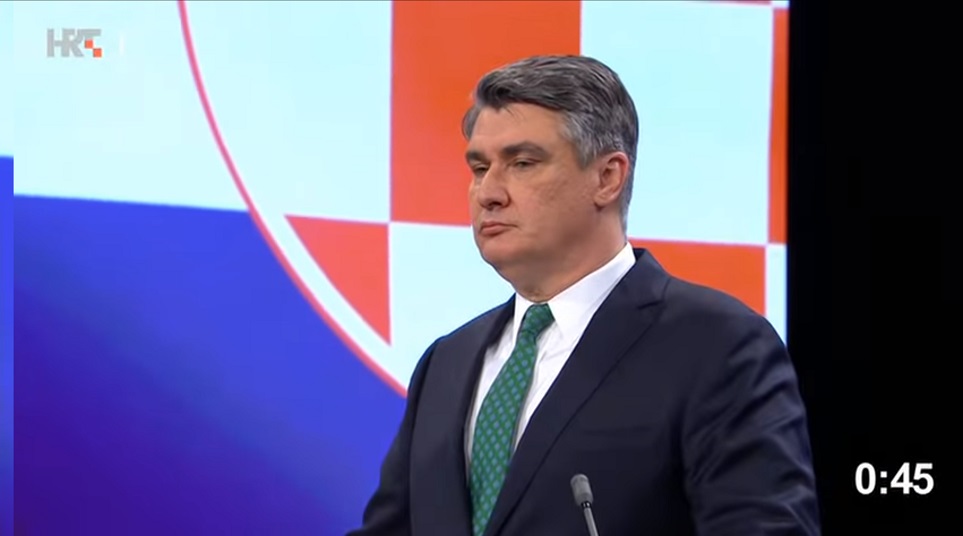
Do Jihadists in Bosnia pose a threat to Croatia?
Milanović: I believe SOA (Security and Intelligence Agency) is doing its job. Jihadists in Bosnia are a reality. Standard law enforcement measures will not help the situation there. Kolinda has damaged relations with a country with a Muslim majority due to her reckless stories.
Kolinda: I have don’t have any problems with Muslims. I didn't ruin the SOA; I don't interfere with their work.
Milanović: Kolinda hangs out with people who steal. I'm not saying she's stealing, but she's a serious problem for the system of national security.
How would you detect and prevent corruption?
Milanović: Saucha (former assistant to Milanović) has been indicted, and he now supports Kolinda and the HDZ. Kolinda arrived (to the debate) today from a celebration held by (Milan) Bandić - these messages are dangerous and toxic.
Kolinda: I did not come from a celebration. I was at an event held by a party which supports me comprised of individuals who support me.
Bandić has been indicted in several court cases. Why would offer to bring him cookies?
Kolinda: Bandić is innocent until proven guilty and I will fight for that. Let's not put people on a pillar of shame. Let's not forget Lovrić-Merzel (SDP), and you defended Bandić when he was your friend. Would you pardon Perković and Mustač (Yugoslav Secret Police)?
Milanović: I would not pardon anyone. You are talking to me about corruption. I have a letter here that you sent to the Washington Times praising Sanader before he fled justice.
Kolinda: I had no idea about Ivo Sanader's corruption. After all, he had dismissed me from the government.
Should the Croatian army withdraw from Afghanistan?
Milanović: Yes, immediately. It's been 16 years and it’s obvious that the Americans are not even clear on what to do there.
Kolinda: There has been one (Croatian) death since 2003. We will act as a responsible ally with NATO. My guess is that this process will begin sooner rather than later, and we will discuss it with our allies. Then, we will shift most of our forces to Eastern Europe.
Milanović: We are open to discussion, but we’ll make the decision. The soldier who died had his picture taken with me and asked me not to post the photo because he was still a specialist. A few days later, Kolinda posted a photo with that soldier. I would never manipulate people like that.
Kolinda: That’s false. The soldier waited for an hour at Ovčara to have his picture taken with me. He never asked me not to post that photo.
What do you think about the adoption of children by same-sex partners?
Kolinda: The adoption and foster care application process is very difficult in general, and we need to make it easier. Children need both a mother and father; I do not know if we are ready for the adoption of children by same-sex couples.
Milanović: That is a process which is unstoppable. We need to talk about it, accept it and understand that these trends are unstoppable. And there is a human element to this topic.
How much have your personal assets grown during your five-year term?
Kolinda: I don't know exactly. I’ve put everything in my asset statement. This year, I received a severance from NATO of around one hundred thousand euros. My husband and I live off our wages.
Milanović: That's nice when you get such a large severance pay. At the beginning of your term you had a loan of more than one million HRK. And that was paid off with what money?
Kolinda: I obtained a loan in 1995 with a 4.5 percent interest rate. I had to take out another loan in at a full (interest rate), but that loan was paid off in two years by selling some smaller apartments. How did you get the 180,000 EUR loan at a preferential interest rate?
Milanović: You are making things up again and everything you say is wrong again. This is public information. I was not the prime minister at the time. And, it was a loan for 300,000 EUR with a 6 percent interest rate. I paid back the first portion by selling our first apartment. Not only is this defamation, it is nonsense. At the time of Operation Storm, you got a loan with a 4 percent interest rate when everyone else’s loans were at 14 percent.
Kolinda: Yes, I got that loan as a Foreign Office employee. It was the minimal amount of credit, because I could not afford to borrow more. I paid it off. I’ve worked for all the money I have.
Milanović: That was credit available HDZ guys. You worked for that? It's unfair, dishonest and immoral…
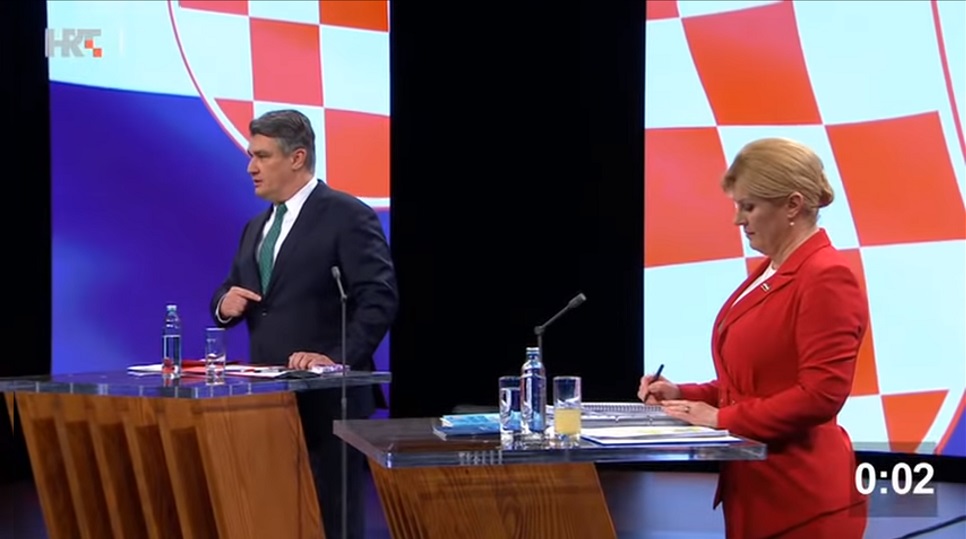
What did Kolinda mean when she talked about the coup?
Milanović: In 2015, Kitarović formed her government, after only 40 days of consultations with (Tomislav) Karamarko which went on behind my back. She was doing her best to undermine the center-left government.
Kolinda: In the first two years of my term, two rounds of parliamentary elections were held. I absolutely stand behind my claim that I maintained the stability of the state and did everything according to the constitution. There was a possibility of having a transitional government if one did not form within a reasonable time period.
The constitution provides for a 60-day window, so I consulted with constitutional lawyers and the Constitutional Court. I was told that this lengthy procedure would have to be completed because the Parliament would find themselves in constitutional crisis if their mandate expired. I never appointed any government and please don’t slander me. Find the evidence!
Milanović: Of course, you didn't leave any tracks, but people are talking. Sue them if they slander you. Personally, I will respect the constitution. And, (Vladimir) Šeks is a constitutional expert?
Kolinda: Šeks had nothing to do with it, and there weren’t any secret negotiations. You wanted a coup, so you barricaded yourself. Furthermore, you sent me a text message which read: “today you can be a stateswoman and appoint a government or you can give Karamarko control and be his puppet.”
Milanović: That’s defamation, I would never send that kind of message.
Closing Statements:
Milanović: In a few days you will elect a Croatian president. I am here to serve you, not to divide you, to fight against what antagonizes our people, for which they are losing the will to live and stay (in Croatia). Demographics are most successful if a country has fair leadership. For years, we have been led by people who are not fair leaders, but who have networked by formal and informal means. We have a president who hangs out with unworthy people, and a government which has fallen apart because of corruption. This is sending a terrible message. Nothing revolutionary will happen (if I become president), but we believe in making small shifts.
Grabar-Kitarović: When I took office five years ago, Croatia was on its knees because of the disastrous policies of Zoran Milanović, the worst Croatian Prime Minister in history. We have achieved growth which is not yet adequate. I want the GDP to be above five percent, and that positive factors impact your lives and financial obligations. We must stop young people from leaving and complete the process of education reform. We need to encourage entrepreneurship, create jobs, increase wages and pensions, and raise the standard of living. I am interested in our country, not party politics. I unite, rather than divide. My Croatia is a Croatia for everyone.
The presidential candidates will meet for one more debate before the election. Tonight (Friday January 3, 2020) at 20:20h, they will face off on Nova TV.
Follow our Politics page for news on the upcoming presidential election in Croatia, which will take place on Sunday January 5, 2020. We will be providing by-the-minute exit poll results and final election results after the polls close at 19h Central European Time (CET).
Croatian Presidential Debate: Candidates on Abortion, Religion, Gay Pride
Yesterday evening HRT (Croatian Radio Television) moderated a debate between all eleven presidential candidates. It lasted over two and a half hours.
Here is a summary of the top three candidates’ (Kolinda Grabar-Kitarović, Zoran Milanović, Miroslav Škoro) positions on abortion, religious education, “Za dom spremi” and gay pride – according to Index on December 18, 2019.
Croatian Candidates’ Opening Remarks
Kolinda Grabar-Kitarović: I have been your president for 5 years and have been among our people and listened to your problems. I have also repositioned Croatia from a region in Central Europe to a place on the Mediterranean, where it belongs. I’ve raised the issue of demography and I was the first Croatian diplomat.
Zoran Milanović: I have something to offer and want to make our country happier and freer. I have extensive experience and consider politics an honorable job. It is up to our citizens to decide.
Miroslav Škoro: Given that this game has begun, I would like to say that I am sorry that there wasn’t a debate on commercial television. I apologize for that. Kolinda is responsible for this and she must apologize.
Corruption in Croatian Society: How would you fight against it?
Kolinda: Constitutional obligations allow a president to be involved in secret service operations. I would build a collaborative relationship with secret services to address this problem. I've been fighting corruption for years, and it's time to recruit young talent for jobs in secret services.
Milanović: I’m aware of the limitations of a president in this area. The president may nominate the President of the Croatian Constitutional Court and can set an example by whom he chooses to associate with. He sends a signal to the public by paying attention to whom he hangs out with.
Škoro: When it comes to corruption, it is an obstacle to doing business in the Republic of Croatia. I am the only entrepreneur here who deals with business and encounters real problems.
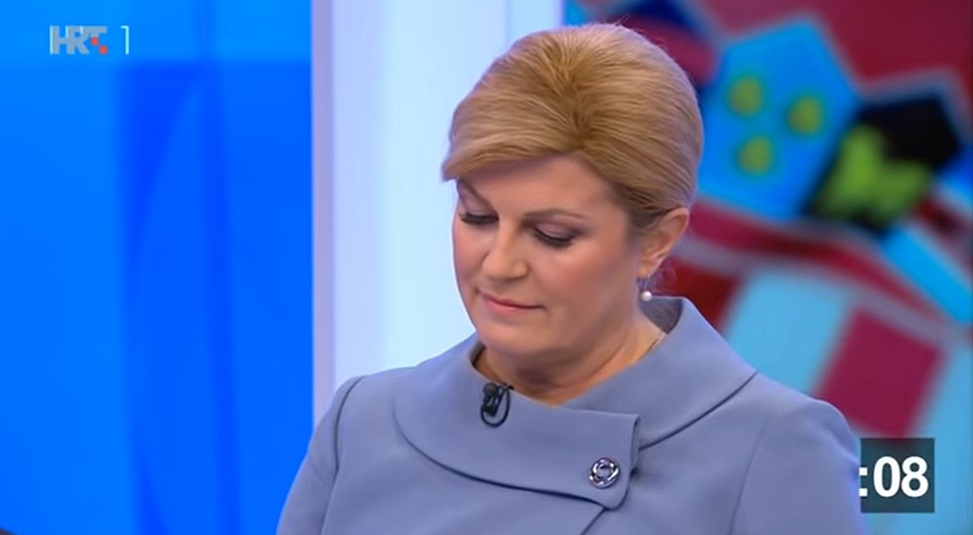
Should the Croatian army be sent to the borders?
Kolinda: The military should come to the aid of the police in border control. Presently, the police are saying they don't need help. The border situation in 2015 was chaos.
Milanović: It’s mindless statement to call the 2015 situation chaos. We did a fine job of transporting people. The police need help now.
Škoro: The border of every country is sacred. There are laws regarding the residence and movement of foreigners. The border absolutely must be protected. There are three types of migrants - refugees, people seeking political asylum and people who want to get from point A to point B. If necessary, the military should be sent to the border.
Should Croatia block Serbia's entry into the EU?
Milanović: Vučić is one topic. Serbia is another.
Škoro: The destruction of Vukovar, Škabrnja ... We all know who’s responsible. We need to address the issue of missing persons, borders and reparations for people who were held (by Serbs) in detention camps. Serbia needs to join the EU only after it meets the highest democratic standards. I will not raise my hand for Serbia's EU accession until that happens.
Kolinda: We need to talk about how to ensure a livelihood for our citizens. We will insist that Serbia meets all the conditions for accession, and they must come to terms with their past. I will absolutely insist that Serbia accounts for the people who are still missing (from the Homeland War in the 1990s) before they join the EU.
What kind of foreign policy should Croatia engage in with Bosnia?
Milanović: After 30 years of missteps, answering this question in one minute would be an insult to Bosnia. No one deserves to have their country summarized in one minute. I support a united Bosnia; half a million Croatians live there.
Škoro: Bosnia is a state of the Croatian people. Currently, Croatians in Bosnia are not autonomous. And Croatians did not elect the government led by Komšić.
Kolinda: Croatians in Bosnia are not the part of the diaspora. Rather, they are indigenous people there. We would support a good neighbor policy but are also fighting for the rights of the Croatian population there, without compromise. Bosnia has a strategic component for us. And to everyone who refers to Croatians in Bosnia as part of the voting machinery – that’s a grave insult.
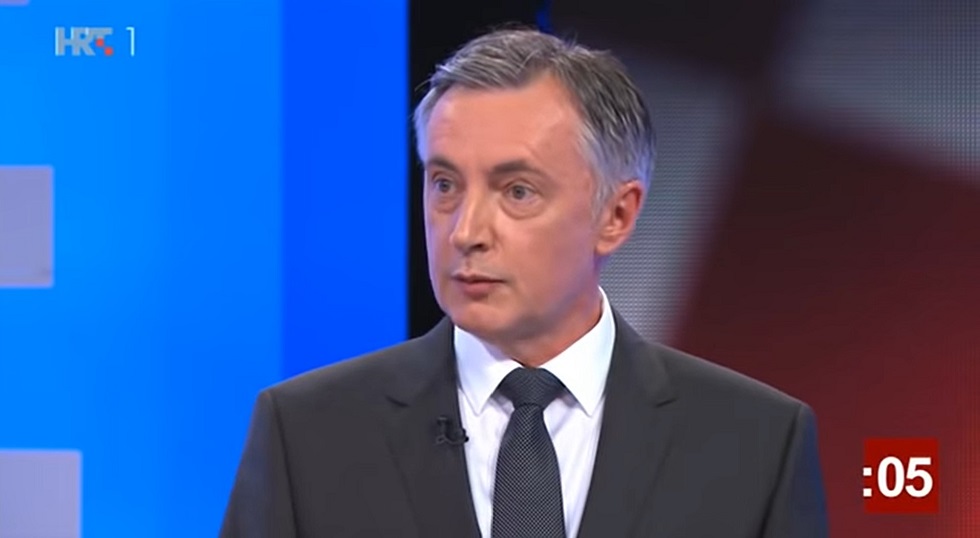
Should official signs in Vukovar include the Cyrillic alphabet – Yes or No?
Milanović: This is a matter of law; the rule of law. I would deal with this issue the same manner again. No one is offended by the co-existence of the Cyrillic and Latin alphabet in Vukovar cemeteries. I’ve acknowledged that perhaps I moved a little too quickly (as Prime Minister), and I could apologize for that. The HDZ (Croatian Democratic Union), the party of Kolinda and Škoro, is the one who created the legal framework in Vukovar. That's the truth and the whole truth. I enforced the law which HDZ put in place.
Škoro: I haven’t heard so much hate speech in one place for a very long time.
Kolinda: I've been going to Vukovar for years, for the (commemorative) days year after year. Their concerns are existential concerns, but war wounds still fester. Justice has still not been served. Why push for the Cyrillic alphabet before justice has been served? This issue needs to be addressed first, and then it will be right time to address the Cyrillic (signage).
Abortion?
Milanović: It's a matter of choice. It's a difficult situation, but it's first and foremost a woman's choice.
Škoro: I am against abortion and for protecting life from conception to death.
Kolinda: Life begins from conception to natural death. A ban on abortion would solve nothing and cause even more health problems. I am more for education, especially for young people, women and men, and for facilitating adoption and other measures which will reduce the number of abortions in the Republic of Croatia.
Religion in Croatian schools?
Škoro: The church is deeply rooted in the Croatian identity. I don't see why having religious education in schools should be a problem. I spent my entire childhood and youth in religious education and didn’t learn anything harmful there.
Kolinda: Religious education is an elective subject. I don't see what the problem is. Croatia offers religious instruction, which is a topic of culture in general. And children who do not go to church have an opportunity to learn something about other faiths.
Milanović: Religious education can be offered, but only as an elective course. But not in the third hour of school – that’s not an elective class. It must be at the end of the school day, during the last hour.
Would you participate in a gay pride or a pro-life march?
Škoro: We are discussing peripheral matters. Sexual orientation is a private matter for every person and should not be flaunted publicly, and I would gladly attend a pro-life march.
Kolinda: I do not know why these two demonstrations must be in opposition to one another. I only participate in the commemoration march (in Vukovar). I am responsible for all our citizens.
Milanović: Three days ago the Germans announced that homosexuality is normal. What else can I say?
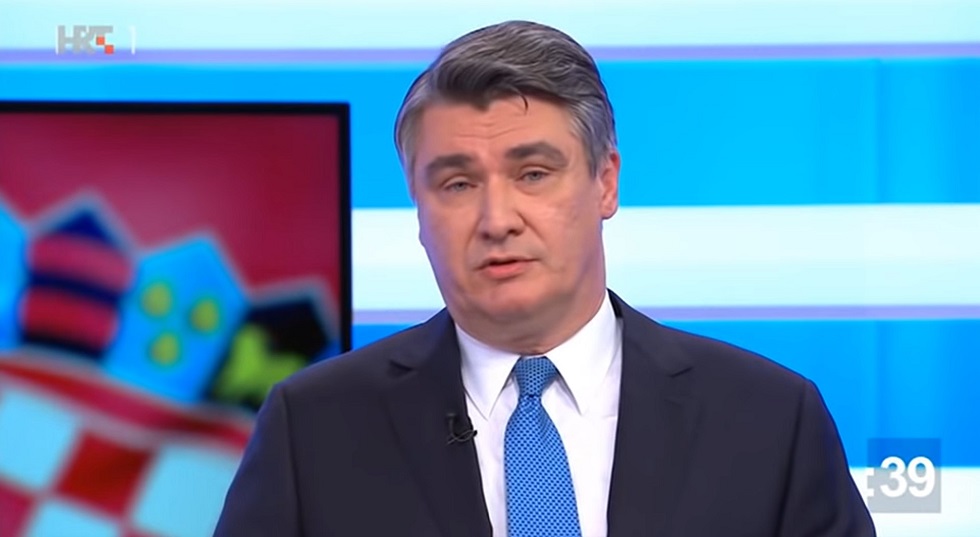
What does Franjo Tuđman mean to you? Tito?
Kolinda: For me, Tuđman is of the same caliber of Dr. Ante Starčević. I also established the Velered (highest honor in Croatia) for Dr. Tuđman. Tito played a positive role in anti-fascism, but he committed crimes after that.
Milanović: Broz, Radić, Tuđman and Krleža - these are people who defined the Republic of Croatia in the 20th century.
Škoro: Milanović is responsible for Lex Perković (Josip Perković is the former director of Yugoslav-era Croatian secret police).
Milanović: Perković was a HDZ guy who ate out of Tuđman’s hand.
What are your views on the slogan “Za dom spremi” (Ready for the homeland)?
Škoro: It's a salute that was used to say goodbye during the time of the NDH (Independent State of Croatia), but it was also on the sleeves of HOS members (among the first organized Croatian military defense forces in the Homeland War in the 1990s) and I don’t have a problem with that.
Kolinda: We need to stop discussing ideological issues. “Za dom spremni” was an Ustasha salute, but it was also on the insignia of the HOS forces and it had an entirely different meaning then.
Milanović: The Croatian Constitutional Court delivered two judgments which determined it to be hate speech.
Candidates’ Closing Remarks
Kolinda Grabar-Kitarović: I invite you to go to the polls on December 22nd. As your president, I have traversed every inch of this country and have developed my policies and program based on your problems, hopes and dreams. We must improve our situation. All I have heard tonight is a wish list, and rarely from anyone who really has a program. I am offering you action and diligence. Instead of inaction, I am committed to growth, sincerity and progress among our people and not arrogance. I am offering a message of unity: Croatia is for everyone.
Zoran Milanović: As your president, I will restore fundamental dignity and decency. As a politician I have worked hard and have made mistakes: abolished parliamentary pensions and opposed banks. Times change, I do not seek greater powers (within the Croatian presidency) because I consider those to be a path to tyranny. The president must maintain an objective distance and not be involved in money-related matters and staff decisions. I am here to serve and to seek your trust and vote.
Miroslav Škoro: This time (the presidential debate) was useful for viewers to see how futile this process is. I am a man who fights against the system. I am proposing radical changes and am seeking increased powers (within the Croatian presidency). On December 22, we will change the Constitution. I worry about one thing: my election observers have not yet received SEC (State Electoral Commission) accreditation and it all smells like election fraud.
Follow our Politics page for more information on the presidential candidates and the upcoming elections.
Croatian Radio Television Editor: HRT Needs Funding for Better Programs!
“If everyone paid 96 HRK (12,90 EUR) a month to HRT (Croatian Radio Television), we could perform miracles.” It’s not that ideas are lacking, or that people aren’t creative,” according HRT’s Editor-in-Chief, but HRT is not receiving adequate funding.
HRT, the main public broadcasting service in Croatia, is funded mostly through a compulsory monthly subscription fee of 80 HRK (10,75 EUR).
Program Council Postponing Presidential Election to 2020
On Monday, the HRT Program Council postponed the election of a president until their next session, which is scheduled for January 27. They also discussed Croatian Radio Television's production program for 2020, without providing a positive appraisal of that program, according to Telegram/HINA on December 16, 2019.
The election for the President of the Program Council was postponed after council members failed to elect a president during the four election rounds at the last session in mid-November. None of the candidates had achieved the required six vote majority.
The program council currently consists of nine members, although eleven are legally mandated. On Monday they also discussed the public service broadcasting program for the upcoming year. However, only five members gave the proposed program a "positive assessment” and included their recommendations in the Program Council's comments, while three members abstained.
Croatian Radio Television 2020 Program Still Under Review
HRT's program for next year was presented by the public service broadcasters, who emphasized that the monitoring of Croatia's EU Council Presidency, the European Capital of Culture in Rijeka, the EURO and the Olympic Games in Tokyo are among most important upcoming projects in 2020.
During the discussion regarding the upcoming planned Croatian Radio Television output and the implementation of contractual programming commitments; the members of the Program Council made several comments, most notably about the informative programs, the procurement and selection of content from external productions and the output of local HRT stations.
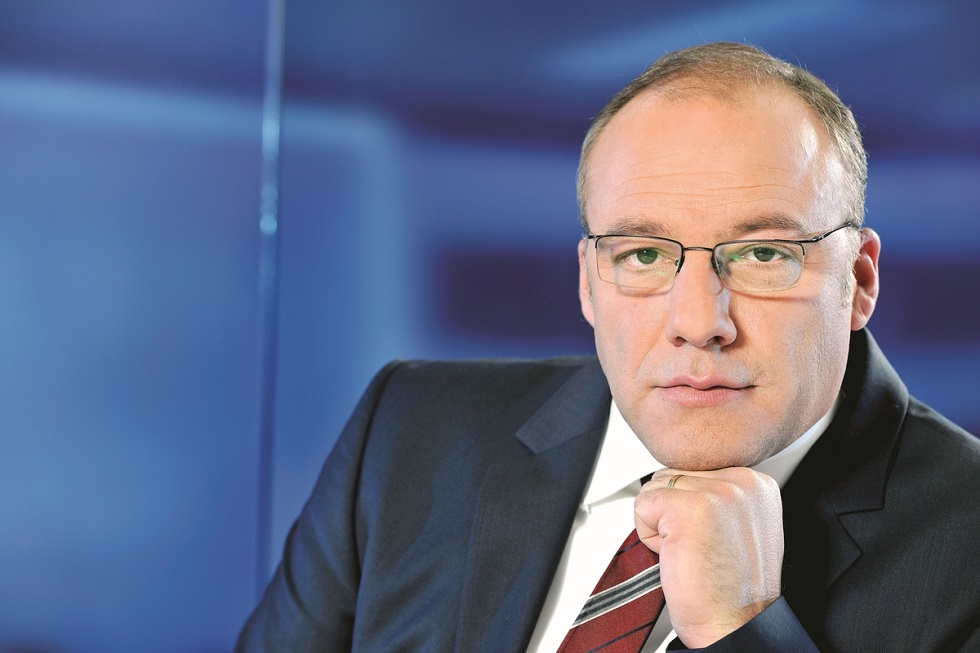
Stipe Alfier | HRT
Did Not Report Zagreb Advent Misconduct and Presidents’ Bus Accident
Recently elected HRT Program Council member Stipe Alfier sharply criticized HRT’s public service broadcasting and cited the recent avoidance of major news topics in news programs - including the alleged misconduct of the Zagreb Advent Organization and the failure to report a bus accident during Kolinda Grabar Kitarovic’s presidential campaign.
Katarina Periša Čakarun, the head of HTV's Information Media Services (IMS) department, dismissed Alfier's allegations regarding HRT’s avoidance of these topics. Bruno Kovačević, editor-in-chief for all HTV television programs, emphasized that there was room for further improvement in HRT programming in accordance with their obligations, and the agreement between HRT and the Croatian government.
Need to Raise Monthly Fee for Better Programming
"We could produce much better programming. It’s not that ideas are lacking, or that people aren’t creative. Don’t forget that our fee has been 80 HRK (10,75 EUR) a month for the last nine years. It should be 96 HRK (13 EUR). According to our calculations, 96 HRK would amount to 1.5 percent of the average net salary in Croatia (6,418 HRK or 862,11 EUR). We could perform miracles with that 16 HRK difference,” Kovačević declared.
Note that the well-known UK-Based public broadcaster BBC has a similar compulsory monthly fee, which is currently 15,26 EUR and only 4,5 EUR more than the HRT fee. According to recent statistics, the average UK monthly net salary is 2907 EUR, which means that the BBC monthly fee for UK residents is on average only 0.525 percent of their monthly take-home income!
In addition to discussing programming, the HRT Program Council members also created a list of candidates for the Commissioner for HRT Consumers position after a public call for applications. Ten applications have been submitted.
Compulsory Monthly Fee Under Increased Scrutiny
The compulsory monthly HRT subscription fee has recently come under increased scrutiny. Up until 2015, HRT inspectors could enter private homes and businesses to verify that occupants owned receivers, which are defined as any device that can receive an HRT television or radio broadcast. If the inspector verified that the home owner, resident, tenant or business owner owned a receiver, they were required to pay the HRT monthly subscription fee.
The inspectors also had the authority to assign the compulsory 80 HRK fee, even if no one answered the door for this inspection, which is no longer the case. If certain conditions are met, a resident can submit a written request to be exempted from paying the monthly fee. Those conditions include: not owning a receiver, moving into assisted living or a nursing home and death. All three conditions require written statements and supporting documents. More information and an application can be found here.
According to Luka Filipović/tportal on December 16, 2019 – HRT representatives have confirmed the recent court ruling that an authorized HRT inspector is not allowed to enter a home or apartment unless the occupant provides consent.
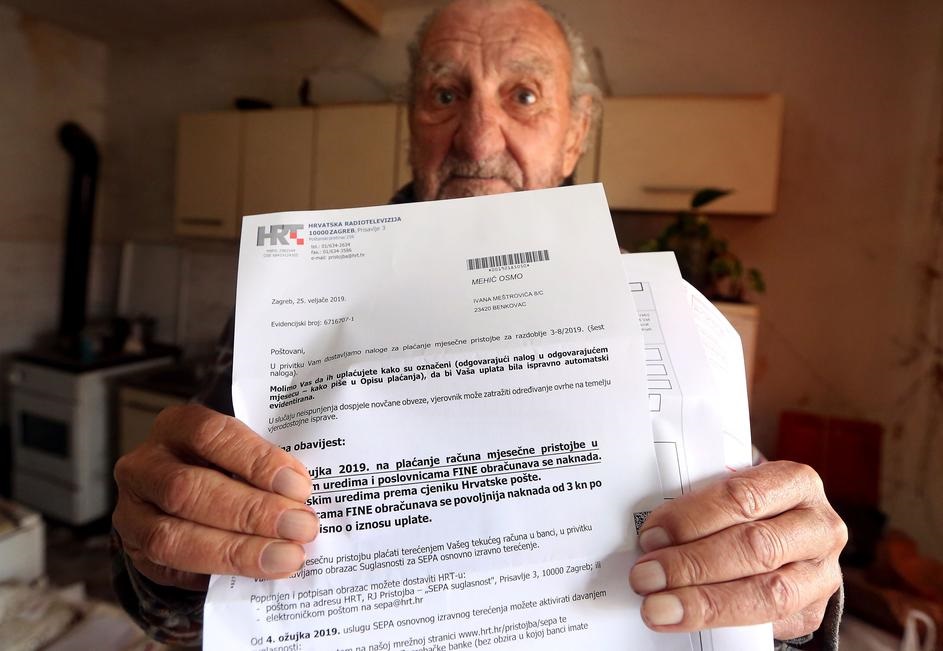
Ukinimo HRT Pristojbu | Facebook
Croatian Radio Television Inspectors Can't Enter Without Consent
"The authorized HRT inspectors do not have a court order to enter a home or apartment. When performing field inspections, they are obliged to furnish their official HRT identification. They can perform an inspection only in the event of a residents' consent. That inspection involves entering an apartment and making a record of established facts," Croatian Radio Television explained.
HRT reports payment inspections for a specific area to local police stations and informs them of the authorized HRT inspectors who will be conducting those inspections. "If citizens call the police during the surveillance procedure, the police will not respond because the the inspector's activities have already been reported to the local police stations," HRT emphasized.
Citizens Should Contact Police Regarding HRT Inspector Misconduct
A representative for the Croatian police emphasized that citizens are encouraged to request a police intervention by dialing 192 if they believe that their rights have been violated or have been subject to unlawful behavior. "A police report is submitted immediately, and officers will go to the scene to collect relevant information and analyze the event," a MUP representative explained.
Follow our Lifestyle page for updates on HRT programming and changes to the compulsory monthly fee.
Croatian Radio Television (HRT) Monthly Fee: Everything You Need to Know
According to the law, an 80 HRK monthly fee (or mjesečna pristojba), payable to HRT (Croatian Radio Television), is mandatory for anyone who lives in Croatia and owns a receiver which can accept transmissions of radio or audio-visual programs. Here is an explanation of where that money goes, your rights and how you can obtain an exemption.
You’ve just settled into a new address in Croatia and hear a knock on your door. But you don't answer, so they leave. Days later you receive your first monthly bill for 80 HRK (10,75 EUR) payable to HRT (Croatian Radio and Television)! Until recently, this questionable conduct was legal.
For a non-EU citizen, the controversial mandatory monthly HRT fee (or mjesečna pristojba) may come as an unwelcome surprise. HRT is considered “public television” in Croatia. Public television in the United States, for example, is mostly funded by donations from corporations, private benefactors and so-called “viewers like you”. So, by comparison, they depend mostly on revenue from voluntary, rather than mandatory sources. Only about 11% of US public television revenues come from federal sources, which are funded indirectly by taxpayer dollars.
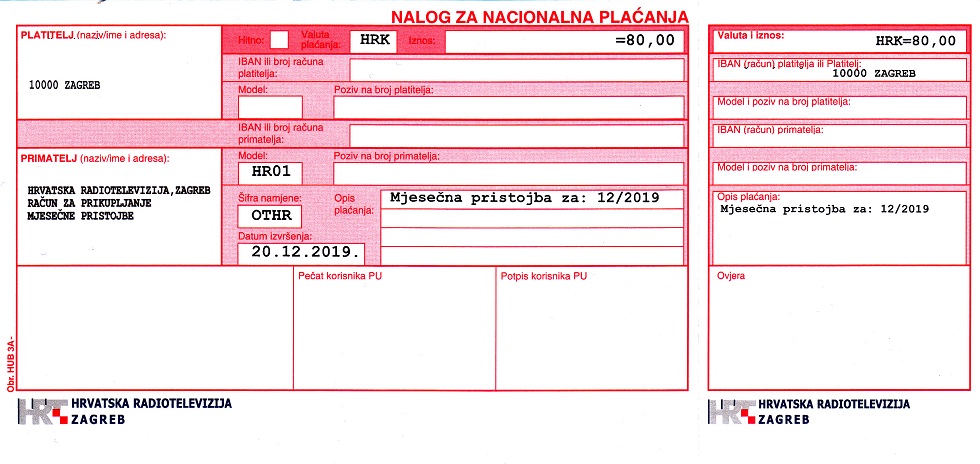
mjesečna pristojba
Who has to pay the Croatian Radio Television (HRT) monthly fee?
According to the Law on Croatian Radio and Television (Zakon o Hrvatskoj radioteleviziji), the monthly fee is mandatory for anyone who owns a receiver which can accept transmissions of radio or audio-visual programs. Radios, TVs, computers, laptops, car radios, smartphones and tablets are all considered receivers. If you or anyone in your household owns one or more of these receivers (one fee per household), you are required by law to pay the fee even if you're just a tenant.
Where does the HRT money go?
This monthly fee is not entirely allocated to HRT, rather a portion of it is earmarked for a special fund which finances other forms of electronic media.
HRT, as a public service broadcaster, and the beneficiary of a largest portion of the fee, must comply with a series of federal legal guidelines, and provide regular financial reports to the Croatian Parliament and public. The law stipulates that this type of public financing (along with the proceeds from advertising) ensures financial independence and therefore promotes high-quality independent media programming. You can read in more detail about these allocations here. A summary of how that money is allocated:
68.4% | 55 HRK - Program production costs.
11.7% | 9 HRK - Broadcasting, including appropriations for Transmitters and Communications (OiV), the Croatian Composers Society (HDS), the Croatian Performing Rights Protection Association (HUZIP) and the Association for the Protection, Collection and Distribution of Phonogram Rights (ZAPRAF).
4.5% | 3,5 HRK - Legal fees (the Fund for the Promotion of Pluralism and Media Diversity, the Electronic Media Council and the Croatian Audiovisual Center).
4.4% | 3,5 HRK - Expenses for the organizational units of the Croatian Broadcasting Company which are related to the performance of a public activity (Working Unit Fee of Croatian Radio-Television, Working Unit Archive of Croatian Radio-Television, Working Unit Internal Audit of Croatian Radio-Television).
11% | 9 HRK - Operating expenses (provisions, value adjustments and financial expenses).
Why wouldn’t people want to pay the HRT fee?
A monthly fee of 80 HRK may not seem like a lot of money. Nevertheless, that totals 960 HRK/130 EUR annually which is no small amount; especially for students and retirees. A supplemental health insurance policy or “dopunsko osiguranje” often costs less. And some people simply do not have, or don’t use, any of their receivers to watch or listen to HRT programming. So, why should they pay for a service they don’t use? A group called “ukinimo HRT pristojbu” (let’s abolish the HRT fee) has existed on Facebook since 2015 and has over 41,000 followers. Their website can be accessed here.
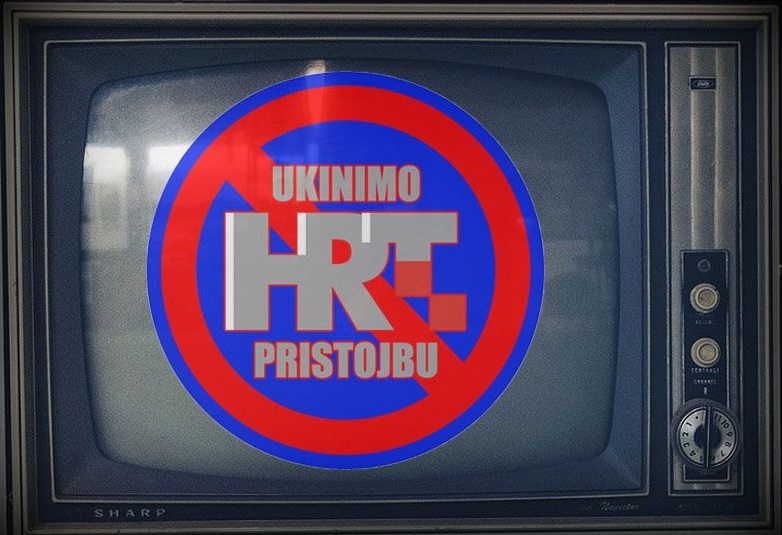
“ukinimo HRT pristojbu” (let’s abolish the HRT fee) | Facebook
How to obtain an exemption
It is possible to apply for an exemption. In order to unsubscribe from the mandatory fee, it is necessary to fill in the cancellation form titled “Zahtjev za odjavu obveze plaćanja mjesečne pristojbe”, which can be downloaded here. Just complete it, sign it and deliver it to the following address:
HRT
RJ PRISTOJBA
Prisavlje 3
10 000 Zagreb
This can be done in person, by mail or through an authorized individual. It is important to note that it is no longer necessary to authenticate (or notarize) the form. The cancellation takes effect from the first of the following month from the date of the signed received cancellation form.
The HRT cancellation form notes three acceptable reasons to “unsubscribe” from the fee:
- No receivers (for watching or listening to HRT programming). A separate written signed declaration must be included with the form.
- Moving to assisted living or a nursing home. Proof of the new address must be provided.
- Death of the “subscriber”. A death certificate is required.
Since most people have at least one receiver, choosing the first option seems infeasible. However, the burden of proof falls on HRT, and a recent court decision has made that burden even more difficult.
Is an HRT Inspector allowed to enter your home?
Due to a judgement from the High Administrative Court (Visoki upravni sud), enacted in August 2015, which bans unauthorized entry into private homes, no one is permitted to enter a private apartment or house without a court order and the presence of an authorized person (i.e. a police officer).
Therefore, no one is required to allow an HRT Inspector to enter their home to verify possession of any receivers. Recently, the Croatian Consumer Network (Mreža potrošača Hrvatske) went even further and claimed that HRT Inspectors were violating the law by conducting these payment checks for HRT. They urged citizens to resist "HRT arrogance" and call the police when they see HRT Inspectors in buildings or in front of their homes.
Nevertheless, there have been reports of recent incidents where people have allowed HRT Inspectors into their homes. Most of these cases involve tenants and students, who are unaware of the recent legislation.
A recent court decision also rejected the HRT practice of automatically subscribing anyone who doesn’t allow an HRT Inspector to enter their home, according to Narodni List. Before that court decision, that person would automatically begin to receive monthly bills for a subscription if they had refused entry to an HRT Inspector. That is no longer the case today. This also applies to ex-subscribers and HRT is not allowed to re-subscribe anyone by default.
How can HRT legally demand payment of the monthly fee?
The recent court ruling also explains that HRT may, however, file a misdemeanor charge (indictment) and initiate proceedings against anyone who is suspected of watching or listening to HRT programs on their receivers. Since a private household can legally refuse entry to an HRT Inspector, it will be difficult for HRT to prove that a household owns any receivers or uses them for HRT programming. However, streaming HRT content on a PC or the HRT smartphone app requires a user to register with an email address on the HRT website, which would allow their activity to be monitored.
For fans of HRT programming, the 80 HRK per month might be considered money well-spent. HRT continues to produce an array of fine programs, all of which can be streamed online, including the acclaimed Novine series, which was picked up by Netflix last year.
For more information on Croatian media and culture follow our Lifestyle page.
Television Broadcasters Earn 143.3 Million Kuna in Profit
ZAGREB, November 20, 2019 - The total profit of television broadcasters in 2018 was 143.3 million kuna, shows an analysis conducted by the Financial Agency (FINA) on the occasion of World Television Day, November 21.
In 2018, there were 52 companies broadcasting television programmes with 3,794 employees, their total revenues amounting to 2.3 billion kuna, up 2.3% from the previous year.
Their expenditure was 2.1 billion kuna, 0.6% more than in 2017, and they earned 143.3 million kuna in net profit, 7.8% more than in 2017.
Thirty-four broadcasters operated at a profit of 155.5 million kuna, an increase of 4.8%, while 18 incurred 12.2 million kuna in losses, a drop of 21.3% compared to 2017.
The average monthly net salary in those companies in 2018 was 7,295 kuna, 1.6% lower than in 2017 and 30.6% higher than the average monthly wage in all companies in Croatia, which totalled 5,584 kuna.
The sector leader was Croatian Radio and Television (HRT), with a total revenue of close to 1.4 billion kuna, which accounts for 59.5% of television broadcasters' total revenues. The HRT also earned the highest profit, of 81.3 million kuna, and had the most employees, 2,741, whose average net wage was 7,181 kuna.
Nova TV was second in terms of the number of employees - 324, with a total revenue of 418.7 kuna and a net profit of 51.9 million kuna. Nova TV is followed by RTL Hrvatska, which in 2018 employed 265 people. Its total revenue amounted to 342.6 million kuna and its profit to 13.4 million kuna.
Unlike the 2008-2012 period, when television broadcasters operated at a net loss, which in 2012 amounted to as much as 169.2 million kuna, in the 2013-2018 period positive results were achieved, and the highest net profit was recorded in 2018, according to the FINA analysis.
More news about media in Croatia can be found in the Business section.
Programming by Croatian Public Broadcaster Not in Keeping with Current Trends
ZAGREB, November 5, 2019 - The law on the Croatian public broadcaster HRT, passed in 2010, provides for the production of programming that is now outdated and not in keeping with current trends, Andreja Arežina Grgičević, editor in chief for the HRT's website and non-linear media services, told the South East Europa Media Forum (SEEMF) in Zagreb on Tuesday.
"We need more money to be able to produce new content because we will find ourselves in a situation where we are fighting big players such as Netflix and Amazon. We, of course, do not have that money because since 2012, when the monthly subscription was set, we have been getting the same amount of money and have had to produce more programming," she said.
She added that of the monthly fee of 80 kuna, 55 kuna goes towards the production of programming and the rest to the Media Pluralism Fund and other institutions connected with broadcasting and the activity of the public broadcaster.
"If we now decided to increase the subscription fee, and under the law it could be up to 1.5 percent of the average monthly salary in Croatia, we would immediately face pressure from various social groups, not just political ones. Speaking about the HRT can score political points, and it can be heard in public that public television is not needed, that it does not produce the kind of programming it should and that the subscription fee should be lowered," Arežina Grgičević said.
She said that the HRT was facing pressure from political and social groups and was trying to produce programming in accordance with the HRT Act and the agreements with the government while at the same time trying to cope with fast changes in the media sector.
"We are in a situation where we have to abide by the law and where politicians decide on the director general and choose the Programming Council. We cannot speak of immediate dependence on politics, but pressure is coming not just from politicians but also from different social and interest groups," Arežina Grgičević said.
Speaking at a panel discussion on public media services facing financing problems and political pressure, Professor Viktorija Car of the Zagreb Faculty of Political Sciences said that the situation at the HRT in the last 15 years was "the worst ever" because the management was incapable of ensuring prerequisites for satisfactory programming benefiting all citizens.
Belmin Karamehmedović, the director general of Bosnia and Herzegovina's BHRT public broadcasting service, and Susanne Pfab, the director-general of the German public-service broadcaster ARD, also spoke about problems faced by public media services.
More news about Croatian Radio Television can be found in the Lifestyle section.
Court Rules HND President Fired Unlawfully by HRT
ZAGREB, October 29, 2019 - The Zagreb Municipal Labour Court ruled on Tuesday that the president of the Croatian Journalists Association (HND), Hrvoje Zovko, had been fired unlawfully by the Croatian Radio and Television (HRT) public broadcaster last year.
Under the ruling, which may be appealed, Zovko is to be reinstated as an editor at HRT.
In a statement to Hina, Zovko said that he had expected such a verdict and was satisfied with it. "The verdict confirms what I have been saying from day one," he said.
The dispute between Zovko and HRT ensued after the HRT management last September made a decision on an instant dismissal of its reporter and HND president. The dismissal was initiated based on a complaint by the editor-in-chief of Croatian Television's (HTV) news service, Katarina Periša Čakarun.
Some ten days before that, Zovko tendered his resignation as the editor-in-chief of the HTV Channel 4, saying in a letter that his decision was due to pressure, censorship, an unprofessional choice of topics, lack of organisation and serious technical problems on Channel 4.
This was followed by a meeting with Periša Čakarun, at which she accepted his resignation. However, only two hours later, Zovko was invited to a second meeting at which an argument erupted between him and Periša Čakarun.
HRT said Zovko had been dismissed due to a grave breach of rules of office and conduct, a number of insults he said, inappropriate conduct and inappropriate and unprofessional statements, adding that the incident happened during working hours in HRT offices.
The HRT Staff Council voted against Zovko's dismissal but its opinion was not binding on the HRT management.
Zovko has dismissed accusations from his notice of dismissal on several occasions.
Last November HRT decided to reinstate him but he was suspended on the same day pending the completion of the court proceedings.
Apart from the HND's branch at HRT, Zovko was also supported by international journalists' associations.
More news about pressure on journalists in Croatia can be found in the Politics section.
Strong Reactions to Jelena Veljača's Appearance in HTV's Talk-Show
Jelena Veljača, Croatian actress, writer and activist was a guest on the Sunday talk-show "Nedjeljom u 2" (On Sundays at 2 pm), and her heated debate with Aleksandar Stanković, the host, caused a lot of reactions.
We already reported that on Saturday numerous protests were held in several Croatian towns, supporting the victims of sexual violence and highlighting the inappropriate official response to several such incidents over the past few years.
In light of the growing awareness of the issues of women's rights in Croatia, Aleksandar Stanković invited Jelena Veljača, a well-known Croatian actress, columnist and writer-turned-activist to talk about those issues. Their discussion turned out to be quite heated after the host asked several questions that Veljača (and numerous viewers, who later commented on social media) found to be insensitive and/or inappropriate.
One of them was to do with the #metoo movement, which started in Hollywood, and Stanković asked Veljača to explain why Salma Hayek allowed assaults by Harvey Weinstein for fourteen years. Veljača replied that what he was doing was the secondary victimisation of Hayek, which arose from the fact that he's a white straight man who holds a position of power. She told him that he does not understand that men and women, even in the same position of power, are not equal, which is something that the feminists have been trying to explain for a while now.
She also tried to explain why it took so long for Hayek to report the abuse, that there's no way for us to know why it took so long, and that the women who were abused need to have the right to report the abuse whenever they choose to do so. After that, Stanković asked Jelena Veljača to explain to him the line between benign advances and sexual harrassment, to which she answered that the difference is clear, as advances can be declined without consequences.
After the show, numerous reactions were written on social media, including some strong disapprovals of the questions asked by the host, which prompted him to respond on Facebook today. He said that he refuses to clarify his positions on human rights issues, as he's been talking about those repeatedly during the twenty years of his career. He maintains his position on Salma Hayek but accepts Veljača's suggestion that each victim has a right to report abuse on her own terms.
He added that there are numerous comments he's received on social media, and while most of them are welcome, there are some that were insulting and threatening. He received comments that some of his family members should get raped, and that that would change his mind and make him understand the victims more. Those comments are unacceptable, and he will work hard to protect his family from such comments.


